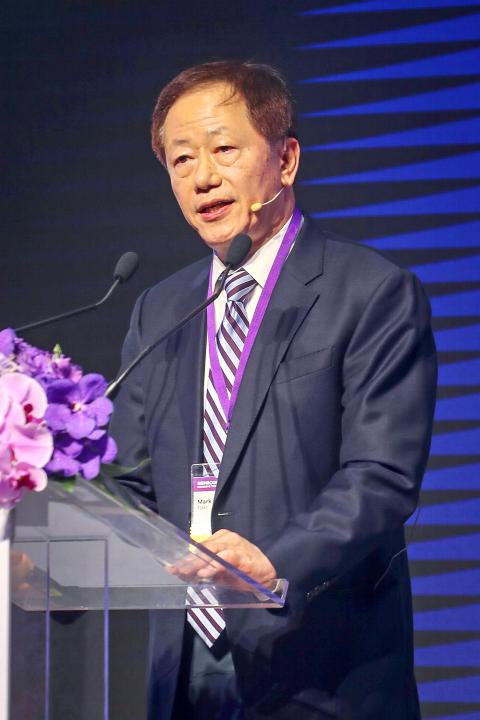Taiwan Semiconductor Manufacturing Co (TSMC, 台積電) chairman Mark Liu (劉德音) yesterday said that he is optimistic about the semiconductor industry’s future growth, as Moore’s Law is alive and well, and should continue to drive industry growth.
Data from international trade group SEMI showed that over the past six decades, global semiconductor revenue has grown to US$480 billion, following the path of Moore’s Law, former Intel Corp CEO Golden Moore’s observation that the number of transistors on a microchip doubles every two years, while the cost per transistor is halved.
Debates have been going on whether a slowing of that ratio would hamper the industry’s growth.

Photo: CNA
“People have asked: Will semiconductors evolve for another 60 years? I’m optimistic about this,” Liu said in a speech to a think tank summit organized by SEMI in Taipei as part of the three-day SEMICON Taiwan show at the Taipei Nangang Exhibition Center, which opened yesterday.
“To TSMC, Moore’s Law is alive and well,” Liu said.
TSMC’s 7-nanometer process technology entered its second year of mass production this year and its 5-nanometer technology is to begin mass production next year, Liu said.
“Next year, we will see rapid expansion for our 5-nanometer technology. Now we are concentrating our research and development efforts on 3-nanometer,” he said.
“We are also making encouraging progress in developing 2-nanometer technology every week. We are entering the ‘pathfinding’ mode [early research and development stage],” he added
“Someday, if everyone has a quantum computing device in his or her pocket, I believe TSMC will not be absent [from that technology]. I believe the development of semiconductors will continue to unfold,” Liu said.
However, a shortage of qualified engineers and other professionals could hamper the industry’s development more than technological barriers, he said.
To create a larger talent pool in Taiwan, Liu called on the government to increase its national technology research budget to encourage university professors and students to engage in semiconductor research.
“Technological leadership is the only way for Taiwan’s semiconductor industry to survive,” Liu said.
Meanwhile, Minister of Economic Affairs Shen Jong-chin (沈榮津) told the summit that the government has approved TSMC’s environmental impact assessment for a new 2-nanometer fab in Hsinchu.
In a separate forum organized by SEMI, TSMC vice president of corporate research Philip Wong (黃漢森) said that with the evolution of Moore’s Law, the company might offer 2-nanometer and even 1-nanometer technology.
However, the technological evolution might not be defined by the technology node, or by the transistor’s geometry, but rather by chip density, Wong said.
Higher chip density helps drive costs lower, while elevating chip performance, he said.

GROWING OWINGS: While Luxembourg and China swapped the top three spots, the US continued to be the largest exposure for Taiwan for the 41st consecutive quarter The US remained the largest debtor nation to Taiwan’s banking sector for the 41st consecutive quarter at the end of September, after local banks’ exposure to the US market rose more than 2 percent from three months earlier, the central bank said. Exposure to the US increased to US$198.896 billion, up US$4.026 billion, or 2.07 percent, from US$194.87 billion in the previous quarter, data released by the central bank showed on Friday. Of the increase, about US$1.4 billion came from banks’ investments in securitized products and interbank loans in the US, while another US$2.6 billion stemmed from trust assets, including mutual funds,

Micron Memory Taiwan Co (台灣美光), a subsidiary of US memorychip maker Micron Technology Inc, has been granted a NT$4.7 billion (US$149.5 million) subsidy under the Ministry of Economic Affairs A+ Corporate Innovation and R&D Enhancement program, the ministry said yesterday. The US memorychip maker’s program aims to back the development of high-performance and high-bandwidth memory chips with a total budget of NT$11.75 billion, the ministry said. Aside from the government funding, Micron is to inject the remaining investment of NT$7.06 billion as the company applied to participate the government’s Global Innovation Partnership Program to deepen technology cooperation, a ministry official told the

AI TALENT: No financial details were released about the deal, in which top Groq executives, including its CEO, would join Nvidia to help advance the technology Nvidia Corp has agreed to a licensing deal with artificial intelligence (AI) start-up Groq, furthering its investments in companies connected to the AI boom and gaining the right to add a new type of technology to its products. The world’s largest publicly traded company has paid for the right to use Groq’s technology and is to integrate its chip design into future products. Some of the start-up’s executives are leaving to join Nvidia to help with that effort, the companies said. Groq would continue as an independent company with a new chief executive, it said on Wednesday in a post on its Web

Taiwan Semiconductor Manufacturing Co (TSMC, 台積電), the world’s leading advanced chipmaker, officially began volume production of its 2-nanometer chips in the fourth quarter of this year, according to a recent update on the company’s Web site. The low-key announcement confirms that TSMC, the go-to chipmaker for artificial intelligence (AI) hardware providers Nvidia Corp and iPhone maker Apple Inc, met its original roadmap for the next-generation technology. Production is currently centered at Fab 22 in Kaohsiung, utilizing the company’s first-generation nanosheet transistor technology. The new architecture achieves “full-node strides in performance and power consumption,” TSMC said. The company described the 2nm process as